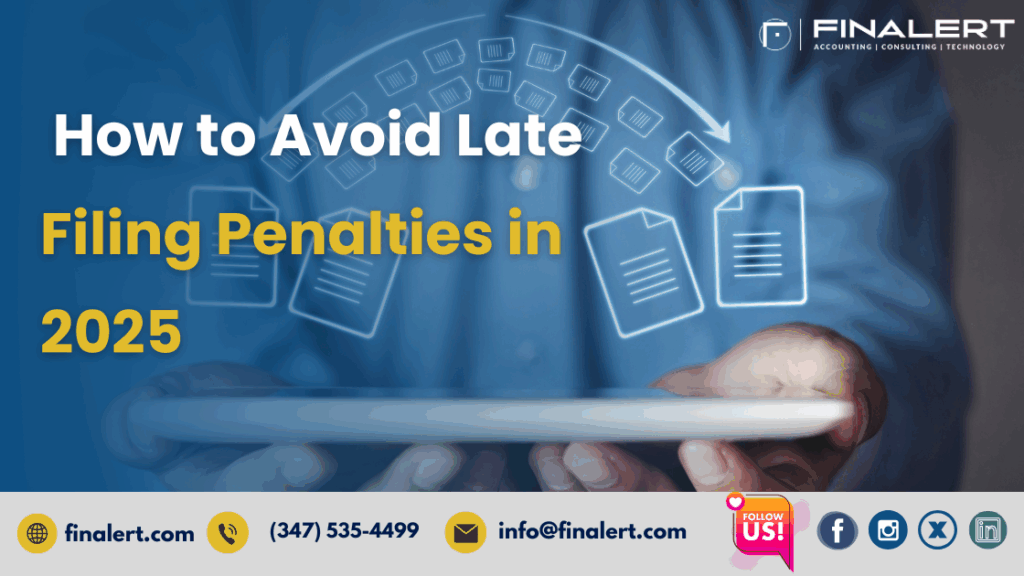
Late Filing Penalties are a costly and avoidable burden for U.S. businesses. In 2025, the IRS and state tax agencies are continuing to step up enforcement, and penalties for delayed returns, whether income tax, payroll, or informational filings, can compound quickly.
For business owners juggling operational demands, compliance deadlines often fall through the cracks. But the financial and reputational risks of missing a due date are too significant to ignore. The good news? With the right systems and awareness, you can stay ahead of deadlines and avoid penalties entirely.
This guide breaks down how penalties are assessed in 2025, the most common late-filing traps for U.S. businesses, and a step-by-step approach to remain compliant across federal and state obligations.
The IRS and most state agencies impose penalties when a return or required document is:
These vary, but common filings include:
Check your Secretary of State and Department of Revenue portals for exact dates by state.
Track all federal, state, and local filing deadlines using a digital calendar or cloud-based task manager. Key features to include:
Include quarterly estimated tax payments and renewal dates for business licenses.
If your business needs more time to prepare a return, file an extension before the deadline:
Note: Filing an extension only gives you more time to file, not more time to pay. Pay estimated taxes by the original deadline to avoid FTP penalties.
Use payroll providers, sales tax platforms, or bookkeeping software that:
This is especially useful for high-frequency filings like payroll and sales tax.
Poor recordkeeping often leads to delays in preparing returns. To avoid this:
Having documents readily available allows for faster filing and fewer errors.
An experienced accountant or fractional CFO can help:
Proactive tax professionals don’t just prepare returns—they help you plan to stay out of trouble.
If you receive a notice from the IRS or a state agency:
Ignoring notices worsens the situation and can lead to levies, liens, or enforcement actions.

✅ Create a rolling tax calendar with all deadlines
✅ Automate filings where possible (payroll, 1099s, sales tax)
✅ File extensions ahead of time when needed
✅ Reconcile books monthly to ensure readiness
✅ Allocate funds for estimated tax payments
✅ Assign responsibility for each type of return (federal, state, local)
✅ Back up all filings and payment confirmations
✅ Respond promptly to IRS or state correspondence
Even partial payment reduces penalties. The longer you wait, the more interest and charges accrue.
You may qualify for First-Time Penalty Abatement if:
For ongoing issues, you can request reasonable cause relief by explaining circumstances like illness, natural disaster, or administrative error.
If you can’t pay in full, the IRS offers installment agreements to help spread the cost and avoid more aggressive collection actions.
Late filing penalties are expensive, avoidable, and increasingly common in 2025 as tax agencies leverage automation and enforcement. Staying compliant doesn’t require perfect timing; it just requires consistent systems, proactive planning, and the right professional support.
By using automated tools, following a clear checklist, and seeking help when needed, your business can file on time, pay what’s due, and avoid the stress and cost of preventable penalties.
Finalert helps U.S. businesses streamline compliance, set up filing systems, and manage tax obligations across all states. If you’re concerned about late penalties or want to build a stronger compliance foundation for 2025, our team is here to guide you.
Similar Articles
No results available
Get in touch with Finalert today for tailored business solutions!
No results available
Ready to thrive? Connect with Finalert today and let’s succeed together in the dynamic global market.
© 2025 Finalert. All rights reserved.
Ready to thrive in the dynamic global market? Finalert LLC offers expert financial services, including accounting, consulting, and technology solutions, tailored to your business needs.
Address
Accounting
Quick Links
Consulting
Industries
© 2025 Finalert LLC. All rights reserved.